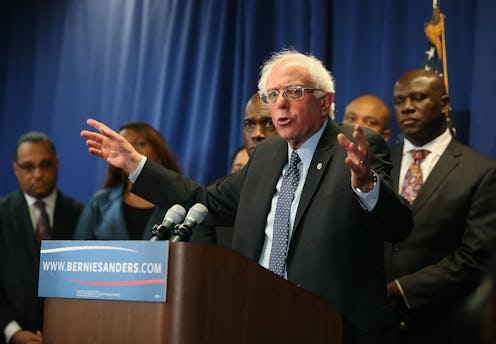News
For Some Reason, Bernie Lacks The Minority Vote
A Monmouth national poll from Tuesday brings both good and bad news for Vermont Sen. Bernie Sanders: he's closed the gap on Hillary Clinton by 11 points since last month, but he's far behind on the minority vote. Overall in January, Sanders stands at 37 percent while Clinton is at 52 percent, but she's beating Sanders among Latinos and blacks by 50 points with 71 percent of the minority vote. This minority disadvantage may not impact Sanders heavily in the upcoming Iowa caucus or New Hampshire primary since these states are heavily populated by whites, but the campaign has reason to be concerned come Super Tuesday on March 1. The Monmouth poll report notes that "about two-thirds of the pledged delegates awarded on March 1 will be from states where black and Latino voters comprise anywhere from one-third to a majority of the electorate."
What is behind Sanders' lack of support from minority voters? An obvious place to look toward is his positions, but this search doesn't yield any clear answers. Sanders has a strong civil rights record that includes his work to desegregate schools in the '60s, and his voting record earned him near-perfect ratings from the ACLU and NAACP, which indicate a long commitment to racial justice. Sanders' plan to move toward greater economic equality — including raising the minimum wage to $15 an hour, providing free universal childcare and tuition-free college, and creating jobs programs for youth — stand to disproportionately benefit minorities. A 2014 United States Census Bureau report shows that over one in five Latinos and one in four black people were living below the poverty level and, as Sanders often notes, minority youths have a much higher unemployment rate than whites.
Sanders was also the first candidate in this race to develop a comprehensive racial justice platform, including issues of police brutality, disenfranchisement, criminal justice problems, and economic injustices. However, he didn't do so until after experiencing controversy last summer over his initial interactions with the Black Lives Matter (BLM) movement. As Vox's Dara Lind notes, Sanders responded with frustration to BLM activists interrupting him at last July's Netroots Nation Conference, while BLM activists were frustrated with his tendency to reduce matters of racial injustice to economic inequality. Since these early months of the campaign, Sanders has evolved on the issue of racial justice, as evidenced by his broadened platform.
Sanders is not the only Democratic candidate to fumble early on with BLM. Clinton came under fire for her "all lives matter" moment last June, and her meeting with BLM activists in August left them underwhelmed. Activist Daunasia Yancey told Yahoo News:
The piece we wanted was a personal reflection on her responsibility in order for us to believe she could take us in a different direction. Hillary Clinton's feeling about mass incarceration and anti-blackness and white supremacy are hugely important.
According to PolitiFact, Clinton, while first lady, "championed" some of the policies in the 1994 Crime Bill that are partly responsible for today's mass incarceration problem, an issue disproportionately impacting the black community.
So, Sanders is not alone in making mistakes. However, he's also not alone in having a generally strong record on race issues. Clinton has a 75 percent ACLU rating and has maintained ratings from the NAACP in at least the high 90s. She has spoken on similar types of economic reforms as Sanders', although most of hers are less extreme: a higher minimum wage (though not $15), increased access to affordable health care, and debt-free college. Clinton's criminal justice reform plan is similar to the criminal justice section of Sanders' racial justice plan. She has spent a comparable amount of time in the debates speaking out about racial issues as Sanders.
A comparison of Sanders' and Clinton's records and their current policy proposals does not give a clear indication as to why minority voters so strongly favor Clinton. But a hint may lie in a Gallup poll from August 2015, which found that 92 percent of black respondents were familiar with Clinton, and 80 percent had a favorable view of her. Only 33 percent of black respondents were "familiar" with Sanders. So, Clinton entered the race as a Democratic candidate with high name recognition and favorability ratings among the black community.
By now, most people have at least heard of Bernie Sanders. There are no race-based polls to follow up the August poll from Gallup, but one result from the new Monmouth poll suggests a good amount of people may not be very familiar with his positions: 26 percent of respondents said they had "no opinion" of him.
The Sanders campaign has put in no shortage of effort to engage minority voters, particularly black voters. In addition to being vocal on economic and racial issues, he met with BLM activists to discuss race issues before Clinton. He was the first to meet with Baltimore pastors to discuss issues impacting the local black community. He garnered the support of rapper Killer Mike. He launched a series of events at historically black universities and colleges. And he regularly says the names of the black men and women who died in police custody over the past couple of years.
Despite what the polls say, Killer Mike believes that Sanders is gaining ground with the black community. As he said to MSNBC's Jacob Soboroff on Monday:
I'm on the streets every day. ... I'm not a fancy guy. I don't get polls delivered to me every morning. ... Neighbors that were telling me 90 days ago, "I don't have a choice but to vote for Hillary," are now putting Sanders campaign [signs] in front of their yards.
